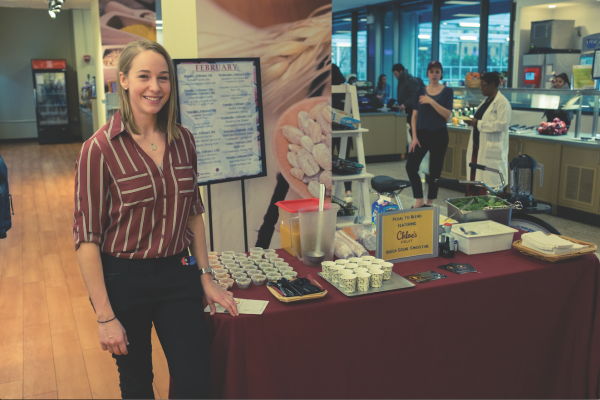A Day in the Life of Fordham’s Resident Dietician
March 15, 2018
If you happened to pass through the Ram Cafe, Community Dining Hall or Argo Tea during the first week of February, you might have met Melanie Simeone, Fordham’s resident dietician and self-proclaimed foodie, conducting the Vegan and Vegetarian Passport Game. This activity enabled Fordham students to catch a glimpse of the healthy vegan and vegetarian options Campus Dining has to offer. Simeone also takes advantage of these activities to educate students on healthy food choices, for she hopes “that these little snippets of nutritional education are the building blocks to a healthy lifestyle in the long run.” Alongside these informational nutrition activities, Simeone assists the Culinary Team in designing menus, guides students with food allergies or dietary restrictions and provides nutritional counseling for any students who seek it.
As the resident dietician for both campuses, Simeone is constantly on her feet, supervising the dining halls at their peak hours. A significant portion of Simeone’s work involves advising and training kitchen staff. Simeone explained, “I’m often walking through the different locations, training employees on what the difference is between vegan and vegetarian, or how to properly prepare a gluten-free sandwich or doing food allergy training for how to identify peanuts in a recipe.” Thus, Simeone provides each dining hall with a broader understanding of people’s food needs.
Simeone finds that students come to her with a myriad of nutritional questions. “For example, someone’s switching to vegetarianism, and they want to make sure that they’re getting enough protein.” Other students might be interested in the best diet plan for marathon or strength training. At any rate, Simeone conducts both short-term and long-term counseling. Additionally, Simeone provides support for students struggling with binge eating disorders or anorexia.
During Simeone’s childhood, cultivating a healthy diet was a daily activity. Chronic diseases like diabetes and cancer were no stranger to Simeone’s immediate family. After Simeone’s brother became diagnosed with type 2 diabetes, Simeone’s “household was very conscious of what we ate.” Simeone’s infatuation with nutrition, however, came about while she was a competitive swimmer in high school. While practicing after school, Simeone noticed that having a pre-workout snack “quite dramatically” boosted her performance in the water.
Later on, Simeone discovered that it was possible for her interest to become her profession. Thusly, Simeone majored in nutrition at SUNY Oneonta, and after finishing her bachelors, she completed a year long dietetics internship in order to become a registered dietician. “You get to experience different aspects of nutrition. Whether it be clinical, serving under a dietician in the hospital or nursing home setting, and then you also have to do community, which is serving individuals that are using government programs or community assistance programs,” Simeone said. The internship also allows prospective nutritionists to explore specialities such as eating disorders or sports nutrition. Following the internship, Simeone was able to take a board exam and become a registered dietician.
Students often come to Simeone for not only nutritional advice, but also career advice. Though Fordham does not have a dietetics program, Simeone assures that the prerequisites for graduate school can be completed at Fordham. Simeone recommends that students interested in becoming dieticians “are always welcome to come ask me questions and get a feel for what the career is like, and also they should reach out to some of the dieticians at their local hospitals or nursing homes to be able to have an opportunity to shadow.” Simeone stresses that getting a picture of what the day-to-day activities of a dietician would look like is the optimal way to determine if nutrition is the best field for you.
In terms of degree paths, Simeone finds that majors in biology, psychology or natural science would be best for fulfilling the required coursework for graduate school. Specifically, courses in anatomy and physiology, chemistry and biochemistry are essential to undertaking a career in dietetics.
Thus, becoming a dietitian requires the perseverance to follow through with the steps to achieve a goal. Simeone continues to strive towards goals in her everyday work: “In a perfect world, I would love to be able to walk into the dining hall and have there be an option for everyone.” Working with the kitchen staff, Simeone assembles menus that aim to introduce students to delicious healthy options, alongside conventional dining hall fare. Simeone hopes that if the dining hall exposes more students to well-prepared, healthy foods, then students will incorporate these foods into their regular diet. Cultivating a healthier Fordham allows Simeone to reconcile her love for food and her commitment to health.














